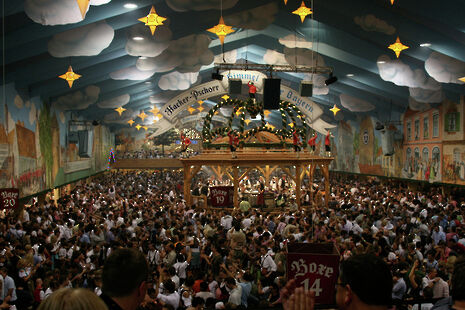Legally German
In her second column, Juliet Morland wonders whether two passports, an MML degree and a year abroad are enough to truly feel German

Waking up on the 24th June 2016, the news that a slim majority of British people had voted to leave the European Union came in the following form on my family WhatsApp group:
Sibling 1: "I’m applying for German citizenship."
Sibling 2: "And I’m applying for Spanish citizenship."
With maternal ancestors from Spain and my paternal grandparents born in Germany, the citizenship of either country was feasible. I opted for German, and, submitting my application just a few days after the vote, became legally German in about six weeks, just three weeks before boarding a plane to Germany ready to start my year abroad. It was only here that the real challenge of adopting cultural Germanness began. Recognising the magnitude of the task, I set myself two specific challenges: adopt German culture as an equal partner to my Britishness and learn to speak the language properly. Not much to ask, right?
Contrary to the impression I had from two years of an MML degree, neither reading medieval German poetry nor being able to discuss German landscape painting count for much with actual Germans. But nor does being legally German. Asking a colleague what makes someone German, he answered “a German passport.” Following up, by questioning whether he considers me German, I was met with surprise that I have a German passport, followed by a condescending laugh. The final answer was a clear 'no.' Obtaining a naturalisation certificate required me to tick some forms and submit a few documents, but adopting a second culture alongside citizenship has been more of a challenge.
“Asking two Germans for help with my accent is a bit like asking a Londoner and a Mancunian for the correct pronunciation of ‘grass’ or ‘bath’.”
With medieval poetry and landscape painting decidedly ruled out, I had to find a form of German culture that resonates with my peers. Following advice from new friends, I began watching German TV shows, switching Friends for Tatort, a German murder mystery series. But anyone can watch TV. It’s only when you aren’t just watching, but also empathising on a cultural level, that you have truly integrated. Like watching Friends has yet to make me a New Yorker, Tatort has certainly not made me German. I find it difficult to warm to a TV series that jumps from location to location, as opposed the comfortable setting of Central Perk café, however good the murder mystery is, as, unlike a German born in the country, I miss the subtlety of accent and don’t pick up on the local references. I also spent a good few months confusing Tatort with a similarly named and vastly inferior show. I was a bit confused by how Germans could be so enthusiastic about this series, that claimed to be a comedy, but four episodes in had yet to make me laugh.
The next cultural suggestion was beer. I like beer, particularly German beer, but the idea that drinking it would radically change my cultural identity was a bit far-fetched. It would be a bit like claiming that Pimm’s held the miraculous power to change a German person’s identity overnight, turning them into a Brit with a simple sip from a glass. Once again, I remain an outside enthusiast.
The second challenge, speaking German like a German born in Germany, has been no more successful. I open my mouth and am immediately hit with the question: ‘where are you from?’ Guesses have ranged from neighbouring France to far away Australia. Both are distinctively non-German. And when I think of friends who moved to a new country as teenagers and still retain a foreign accent ten years later, I’m not hopeful for my own prospects.
I can sit down with one well-meaning friend, living 50km west of Fulda, and another from 50km east and try to rehearse the lip-movement and tongue-location necessary to produce the perfect umlaut, but the perfect umlaut is somewhat mythical, lacking homogeneity. Asking two Germans for help with my accent is a bit like asking a Londoner and a Mancunian for the correct pronunciation of ‘grass’ or ‘bath.’ There are at least two right answers.
Becoming German and living in Germany has made me question my British identity, but has failed to make me a ‘real’ German. Some habits, like my choice in TV programmes, are hard to kick, and others, like my accent, are practically impossible. When it comes down to it, over twenty-one years of passively learning to be British is incomparable to nine months spent enthusiastically trying to be German. I’m still only about as German as Elle Woods is blonde. Legally
 News / CUP announces funding scheme for under-represented academics19 December 2025
News / CUP announces funding scheme for under-represented academics19 December 2025 News / SU reluctantly registers controversial women’s soc18 December 2025
News / SU reluctantly registers controversial women’s soc18 December 2025 News / Cambridge welcomes UK rejoining the Erasmus scheme20 December 2025
News / Cambridge welcomes UK rejoining the Erasmus scheme20 December 2025 Features / Should I stay or should I go? Cambridge students and alumni reflect on how their memories stay with them15 December 2025
Features / Should I stay or should I go? Cambridge students and alumni reflect on how their memories stay with them15 December 2025 Film & TV / Timothée Chalamet and the era-fication of film marketing21 December 2025
Film & TV / Timothée Chalamet and the era-fication of film marketing21 December 2025










